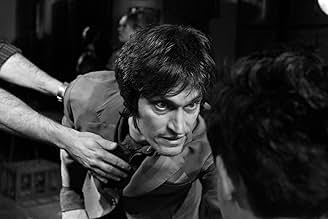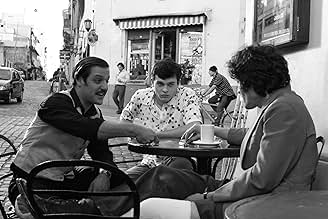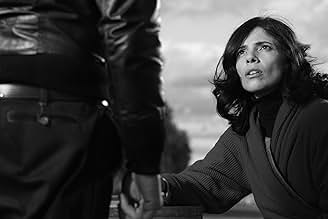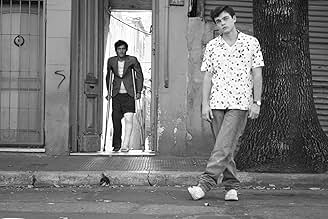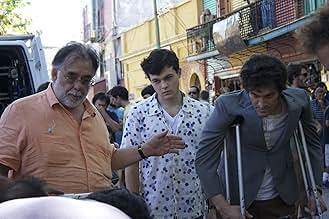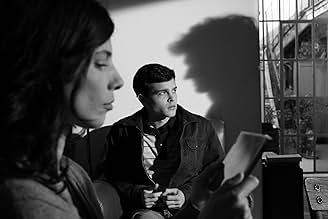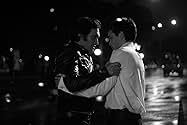Tetro
- 2009
- Tous publics
- 2h 7min
Bennie se rend à Buenos Aires pour retrouver son frère aîné disparu depuis longtemps, un écrivain autrefois prometteur qui n'est plus que l'ombre de lui-même. Il découvre la pièce inachevée ... Tout lireBennie se rend à Buenos Aires pour retrouver son frère aîné disparu depuis longtemps, un écrivain autrefois prometteur qui n'est plus que l'ombre de lui-même. Il découvre la pièce inachevée de son frère, et cela pourrait leur permettre de comprendre leur passé commun et de resser... Tout lireBennie se rend à Buenos Aires pour retrouver son frère aîné disparu depuis longtemps, un écrivain autrefois prometteur qui n'est plus que l'ombre de lui-même. Il découvre la pièce inachevée de son frère, et cela pourrait leur permettre de comprendre leur passé commun et de resserrer leur lien.
- Réalisation
- Scénario
- Casting principal
- Récompenses
- 1 victoire et 6 nominations au total
- José
- (as Rodrigo De La Serna)
- Ana
- (as Érica Rivas)
- María Luisa
- (as Sofía Castiglione)
Avis à la une
It's a while since I last watched Rumble Fish but the brothers there were Mickey Rourke (a rare good film for him at that time) and Matt Dillon. It's about street gangs and pool halls and how an older brother can be very impressionistic on a younger sibling. I'll say no more, except it's a blinder of a film and better than this.
I would have to say that the monochrome cinematography here, though, that everybody drools over is just too dark and contrasty, for this subject and film. I'm a photographer, so hopefully know and whilst Rumble Fish looked superb, that was full of geometric angles and angular paradoxes. Here, the screen is often plunged into almost darkness much of the time.
There is a balletic beauty to much of it though and we veer away from Rumble Fish and on to his works of epic greatness. The Godfathers and Apocalypse Now all share with this, an operatic build up of artistic and emotional tension that is mesmerising. Tetro has this toward the end at the Festival and we start anticipating something big and great. Do we get it? You'll have to see it yourself...
Others have touched on the actual storyline and I'm going to leave that to them. That said, the cast are all good but oddly, Vincent Gallo, as Tetro seems to short-change us. Not performance wise but in that we just don't seem to get to know him, which is part of the whole story, of course. Clamming up into a shell is nature's way of protecting us, emotionally, which is what Tetro did - and still does.
One major plus to this, very bog-standard DVD, was the sound quality - I 'felt' the sound as much as heard it. It prickled my eardrums with a tactile clarity, certainly Hi-fi standard, plus. OK, it was through separate amp and speakers but is as all my TV watching is.
Is Tetro a film for you? That's a difficult one. Art-house cinema lovers probably will and those who like a drama that is quite complex also but those who want action and something akin to Apocalypse Now, no. It is long, visually rich and dark (like plain chocolate) and accordingly, not for everybody but for those who do, it holds many strengths.
Tetro is about family, a subject Coppola is, of course, well-versed in being it the notorious kind (of course, the Godfather) and the more low-level and oddly intimate (Rumble Fish). It's a story, as with Rumble Fish, told in crisp black and white widescreen with flashes of color for flashbacks which may or may not be real, and as homage to operas like The Tales of Hoffmann. The title character, wonderfully and intensely portrayed by Vincent Gallo, is in a creative exile in Buenos Aires, a once promising writer living with his doctor-wife (Maribel Verdu, great as always) who is paid a visit one day by a young man, his brother Bennie (baby-faced newcomer Alden Ehrenreich) who hasn't seen him in years. There's secrets withheld by Tetro, not least of which about their parents, and soon an unfinished, longhand written play by Tetro (real name Angelo) is discovered by Bennie in a suitcase. He'll finish his brother's play, but at what cost?
The damaged, almost bi-polar writer, the insistent and impressionable brother, the strong but uncertain woman, these characters are fully realized by Coppola, and then on top of this comes a sort of terrific puzzle that is constructed through Tetro's unfinished play: what about their father, a famous composer (Klaus Maria Brandeur) who split them apart, possibly, or possibly not? What about their mother, who died in a car accident? What about the bond between Tetro and his former mentor, "Alone", the dubbed "most important critic in South America" who has created a pretentious empire around herself? Questions arise, and Coppola rises to the challenge of giving the audience answers but not spoon-fed. It's first and foremost a story of family, of brothers who love but have to find ways to contend with their damaged selves(inspiration being Rocco and His Brothers mayhap), and it's here that it's just about classic, on par with Rumble Fish if not even deeper and wiser about the effect of parents, or lack thereof, in lives spent and possibly wasted.
The writing is immensely interesting, always, even when Coppola may fall into over-indulging in his fantastic self-indulgence as an artist, such as with the operatic flourishes towards the end (this may not make sense, but compared to the WAY over indulgence of the hard-to-defend Y. W. Y it will). If anything the little imperfections, those brush strokes that go so high with the colors and shadows and impressionistic lighting that he and DP Mihai Malaimaire Jr engage in (one who hopefully will be getting more work following such spectacular work on a mix of 35mm and HD) along with Walter Murch's dependable editing, make it an even stronger work. It should feel a little messy here and there, because its subject matter is about finding a sense of purpose, in each other and in one's art. One feels Coppola working through a history of close but torn family ties, of losing loved ones (i.e. His own son), and at the same time a love of them all and of cinema peeking through in nearly every scene, even the ones where it doesn't look like much is going on.
Tetro is the antidote, basically, for this month's Transformers sequel. If you need to find the polar opposite of a picture based practically on just making money and reeling in the crowds with its dumb giant robot battles and preposterous and shallow theatrics, look no further than a picture which cares about its characters, its multi-faceted story and themes, and about projecting a technique that hearkens back to cinema of the 50s and 60s while sticking to an originality by its filmmaker. This will likely stay with me for a while, which is what Coppola's most profound works have done.
"Tetro" is an artful and somewhat hypnotic adult-oriented drama by the master filmmaker, the very opposite of conventional Hollywood blockbusters. Ehrenreich is reminiscent of Leonardo DiCaprio when he was young while Gallo is broodingly charismatic as the eponymous protagonist. Coppola has always had a good eye for female cast and "Tetro" delivers the goods with Verdú and Gala, although I wish the latter had more screen time. There's a revelation at the end that I failed to anticipate, but should have because everything in the story points to it.
Francis said at the Cannes film festival that "nothing in (the movie) happened, but it's all true." In other words, the film's autobiographical in some ways. The challenge is to perceive the parallels. Two are obvious seeing as how Coppola's father was a famous conductor. The other is when South America's most honored critic asks Tetro if her opinion matters to him anymore and he honestly says it doesn't; sticking her nose in the air, she silently walks away. Like Tetro, Coppola no longer cares what critics think of his works. It's akin to Kurtz' disposition toward the pathetic brass in "Apocalypse Now." The critic's name in the film is fittingly "Alone," played by Carmen Maura. Then there's the fact that Francis has a brother he's been known to have a love/hate relationship with, not to mention how his nephew, Nicolas Cage, is a little reminiscent of the titular character. But none of this speculation really matters; all that matter is that "Tetro" is a creative, operatic, entertaining drama. But stay away if you need constant 'exciting' things going on, like explosions, absurd action scenes and the corresponding CGI (not that there's anything wrong with that, lol).
The film runs 127 minutes and was shot in Buenos Aires & the Andes, Argentina with studio work done in Spain.
GRADE: B
There's a lot of pain about failed ambitions too. Tetro (a mean, brooding Vincent Gallo;"tetro" means 'sad' or 'dark' in Italian), a would-be writer, is hiding away in Buenos Aires, the birthplace of his father, when his younger brother Bennie (excellent newcomer Alden Ehrenreich) appears one night in the pristine white uniform of a cruise ship employee. The action thenceforth is an off-and-on wooing of Tetro by Bennie. Bennie wants to recover his childhood when he worshiped Angelo, as he was then. "Angelo's dead," Tetro repeats. Bennie has felt abandoned for a decade. He is almost eighteen, and ran away from military school and lied about his age to get the job on the ship. Now Tetro does not welcome Bennie at all and keeps saying he ought to stay with someone else or return to the boat, which is docked for repairs.
The 'Godfather' films are full of brother and father rivalries too, but because this film is about waywardness and is in coldly beautiful digital black and white with moments of intense color, it more strongly recalls Coppola's similarly color-highlighted black and white version of S.E. Hinton's 'Rumblefish,' where Mickey Rourke played the dangerous, disreputable but romantic older brother and Matt Dillon the younger one who has missed him.
This certainly isn't Tusa, though. It's Argentina, but also an alternately windswept and mountainous Patagonia, and a world of pure cinematic imagination highlighted by trips into intense Fifties Technicolor with The Red Shoes and The Tales of Hoffman and Copola's own strange evocations of that lushly artificial style. Flashbacks in less intense color recall the father -- perhaps one should write "the Father" -- Carlo Tetrocini (Klaus Maria Brandauer), born in Buenos Aires of Italian family, a composer and orchestra leader hailed as a genius. Carlo has stifled the ambitions of another musical composer brother (played by Brandauer in heavy makeup) and seems to have driven Tetro (Gallo) mad. Tetro lives a bipolar, cosmopolitan life with a warm and sexy Spanish lady called Miranda (Maribel Verdú: we know her from 'Y tu mamá también' and 'Pan's Labyrinth') who discovered him when he was in an asylum and she was a visiting entertainer. Tetro has all but abandoned his magnum opus, a play he can't finish, and works in a theater where he does the lighting.
One can hardly attribute the resentment of the father to Coppola himself; his own father was a minor musician best known for composing music for Coppola's films. Perhaps he himself is the evil father? But then what to make of Sofia Coppola, the acclaimed and successful daughter, a fine director in her own right? The Oedipal themes that arise may be more universal than autobiographical. The mother in Tetro however, is partly missing from the equation, a shadowy figure who who died in a car accident when Tetro/Angelo was driving. There are so many references to accidents one begins to fear one every time somebody goes out. And indeed walking a dog proves dangerous.
Bennie discovers Tetro's hidden manuscripts, which, like hidden memories, are written in mirror writing he says is "military school code." Among various Argentinian friends the youth meets "the most famous critic in Latin America," a woman who calls herself "Alone" (Carmen Maura, another Spanish actress, whom we know from films by Pedro Almodóvar). When Benie first arrives, Tetro has a broken leg. Later he breaks a leg himself, and while recovering he transcribes the MS. into normal writing and adds an ending. "Alone" runs an arts festival in Patagonia, and he has the unwitting collaboration translated into Spanish and enters in the festival competition, which it wins. Tetro rejects all this. Gallo's evocations of depression, anger, and hostility are extremely realistic. His final revelations and eventual warm acceptance of Bennie, whose accident causes him to miss his boat, are perhaps less convincing, though his performance is strong. Ehrenreich, who sometimes resembles a young, but more physically solid Leo DiCaprio, is touching and appealing.
It's not clear at first what the Powell/Pressberger 'Red Shoes' and 'Tales of Hoffman' have to do with the story, except that Tetro took Bennie to see them. But they illustrate a sensibility so steeped in cinema that it can't evoke emotion without remembering films. Everything in Tetro is highly artificial, or simply cinematic, but also convincingly emotional. The tensions between the brothers have been compared to those in Kazan's 'East of Eden,' and Coppola indeed thought of Kazan in making this film and has spoken of a felt rivalry with him. The Patagonian arts festival sequences recall both Fifties comedies and Fellini. For all this artificiality, the film stirred up plenty of discomfort in me. One can perfectly well awaken painful emotions by mimicking old films, as Todd Haynes did in his odd pastiche of Douglas Sirk, 'Far From Heaven.' 'Tetro' doesn't feel resolved; it has a little of the rambling incoherence of 'Youth Without Youth,' except that it is so much more intensely felt. Above all it is a unique work that is beautiful to look at and keeps one guessing. Coppola has said this is the kind of movie he wanted to make when he was young. Very well, it's a bit late for that; but why not?
This an unsettling and interesting film , an intense drama concerning what past has Tetro left behind , being full of emotion , touching scenes , good feeling , marvellous dances inspired by The Hoffman Tales , The Red shoes by Michael Powell/ Emeric Pressburger and a final twist . It is a simple , dramatic and intelligent portrait of two people , focused on brothership , and sibling rivalry which a dark secret will forever change the family's fate . This is an uplifting movie at times , too , not just a tear-jerker or horrific in showing two sibling's suffering , as they attempt to regain the dignity they lost after years spent without seeing . The picture is developed in slow-moving but is pretty well realized . The flick stands out for its melancholy and poignant multilevel exploration of alienation , past records and despair . The story has a certain melancholic style , a climate of transience and sadness that spread the dispute between the two protagonists brothers . Visually it transports one into a dark, grey , nightmarish world but enriched by some colorful images thanks to some flasblacks well photographed by Mihai Malaimare Jr. , these images were shot in colour , but treated to give a slightly faded texture. The screenplay by Coppola himself , acting, direction all come together to create this extraordinary viewing experience . George Gallo gives a nice acting as the burnt-out Tetro , once-promising writer who is now a remnant of his former self , and he is is hot and cold toward his brother . His sibling is finely played by Alden Ehrenreich at his film debut as Bennie, a waiter on a cruise ship who has a layover in Buenos Aires to meet again his brother and subsequently he finds pages of Tetro's unfinished novel, then he pushes both to know his own history and to become a part of his life . Support cast is pretty good with several Argentina/Spain actors such as Maribel Verdú , Carmen Maura , Rodrigo De la Serna , Silvia Pérez , Erica Rivas , Leticia Brédice and special mention for Klaus Maria Brandauer as father .
The motion picture was compellingly directed by Francis Ford Coppola , though far from his greatest successes . Coppola explained that this one was a very "personal" project , being the kind of film he set out to make as a young man, before he was sidetracked by fame , fortune and sucessful boxoffice. Coppola's film The Godfather (1972) became one of the highest-grossing movies in history and brought him an Oscar for writing the screenplay with Mario Puzo The film was a Best Picture Academy Award-winner, and also brought Coppola a Best Director Oscar nomination. Following his work on the screenplay for The Great Gastby (1974), Coppola's next film was The conversation (1974), which was honored with the Golden Palm Award at the Cannes Film Festival, and brought Coppola Best Picture and Best Original Screenplay Oscar nominations. Also released that year, The Godfather: II (1974) , rivaled the big hit of The Godfather (1972) , and won six Academy Awards, bringing Coppola Academy Awards as a producer, director and writer. Coppola then began work on his most important film, Apocalypse Now (1979), a Vietnam War epic that was inspired by Joseph Conrad . Released in 1979, the acclaimed film won a Golden Palm Award at the Cannes Film Festival, and two Oscars. With George Lucas, Coppola executive produced Kagemusha (1980), directed by Akira Kurosawa, and Mishima (1985), directed by Paul Schrader and based on the life and writings of Yukio Mishima . Coppola also executive produced such films as The Escape Artist (1982) , Hammett (1983) , The Black Stallion Returns (1983), Barfly (1987), The Wind (1992) , The secret garden (1993), among others .
Le saviez-vous
- AnecdotesFrancis Ford Coppola claimed that this is the kind of film he set out to make as a young man, before he was sidetracked by fame and fortune.
- GaffesEarly in the movie Tetro stumbles into the kitchen with a broken leg and knocks over some furniture while lighting a cigarette using a burner on the stove. he ignites the burner by just turning the knob on the stove. A few minutes later Miranda must use a match to light a burner on the same stove-top.
- ConnexionsFeatured in At the Movies: Cannes Film Festival 2009 (2009)
- Bandes originalesEl Búho
(2007) (uncredited)
Written & Performed by Lisandro Aristimuño
Courtesy of Los Años Luz Discos SRL
Meilleurs choix
- How long is Tetro?Alimenté par Alexa
Détails
- Date de sortie
- Pays d’origine
- Langues
- Aussi connu sous le nom de
- Francis Ford Coppola's Tetro
- Lieux de tournage
- Sociétés de production
- Voir plus de crédits d'entreprise sur IMDbPro
Box-office
- Budget
- 5 000 000 $US (estimé)
- Montant brut aux États-Unis et au Canada
- 518 522 $US
- Week-end de sortie aux États-Unis et au Canada
- 30 504 $US
- 14 juin 2009
- Montant brut mondial
- 2 874 474 $US
- Durée2 heures 7 minutes
- Couleur
- Mixage
- Rapport de forme
- 2.35 : 1
Contribuer à cette page








